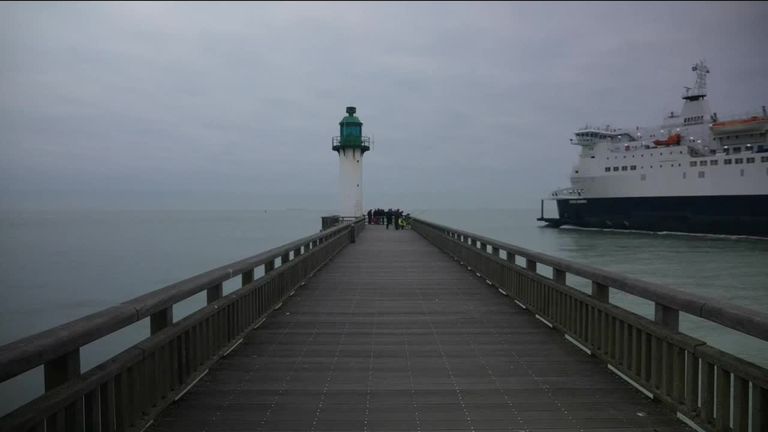Calais port ready for Brexit 'whenever it happens'
The port's boss is confident but his words are in contrast to those who have claimed Brexit would lead to long delays at Calais.
Thursday 28 March 2019 20:51, UK
The Port of Calais is ready for Brexit "whenever it happens" after spending millions of pounds preparing for the UK to leave Europe without a deal.
Jean-Marc Puissesseau, the port's boss, told Sky News that he had overseen €6m of work designed to prepare the port for Brexit, and claimed that if the plans were followed "there should be no more delays after Brexit than there were before".
His words are in stark contrast to many analysts in France, Britain and beyond who have claimed that Brexit, and particularly a no-deal Brexit, would lead to long delays at Calais as lorry drivers were subject to more onerous customs checks.
But Mr Puissesseau insists that his port will mitigate any problems thanks to a combination of new customs processes, which will see hauliers making greater use of internet-based customs declarations, and more space for lorries to park while being checked.
He said: "We have been planning for a no-deal Brexit for more than a year so we have been improving the flow of traffic. We started the building work in January with a deadline of having it done by 29 March.
"We should not be afraid of Brexit. For the hauliers, the only difference is having e-declarations before they leave the country. When they are on the ferry, they will know whether they are going to leave via the green or the orange channel.
"More than 90% of them will be in the green channel, with nothing to declare, no controls, and we don't think they will face any delays.
"In the other 10%, some will get checked. That's normal. But we have more spaces for their lorries now. We have spaces for racehorses, for phytosanitary checks.
"The processes in the port of Calais are like a chain. All the links should come together, whether that is the ferry companies, the police, the border force, or the port itself. If everyone does their jobs properly, there won't be any problems."
Even within Calais, there are those who think that Mr Puissesseau is being optimistic. The town's deputy mayor, Philippe Mignonet, told Sky News that while the port was confident about its infrastructure being ready, it was not enough to just concentrate on what happened within its boundaries.
He said: "They say they will be ready, and in some ways they will be, but what about the traffic going to the port? That is also their responsibility. If the customs impose full controls on day one after Brexit, it would be very complicated. We could have miles and miles of traffic on the motorways around Calais."
It is a charge that Mr Puissesseau dismisses with customary confidence. He says that, as long as drivers fill in the correct forms, there is no reason for the roads of Calais to be affected.
However, he says there should be changes after Brexit, notably in the way that Calais is made to deal with the problem of refugees who try to stow aboard lorries as they prepare to cross the Channel.
Mr Puissesseau told Sky News that he was unhappy about the funding arrangement that, he says, sees the port of Calais pay the wages of 200 staff who patrol the port and stop people from trying to climb on to lorries heading to Britain. In his opinion, the British government should pay towards that wage bill.
He told me: "The port of Calais is spending €50m per year on dealing with these migrants. These 200 people, who deal with migrants every day, are paid entirely by us, and I don't like that. The port of Calais should not have to pay that bill. There should be discussions with the British government about that cost."
He also claimed that there had been "a lack of respect" from transport secretary Chris Grayling, who committed around £100m of public funds to procuring extra ferry services in case of a no-deal Brexit.
Mr Puissesseau said he had met Mr Grayling in November, but had not been told that the government was planning to spend that money. He said Mr Grayling "completely ignored" the port's plans to keep traffic running smoothly.







